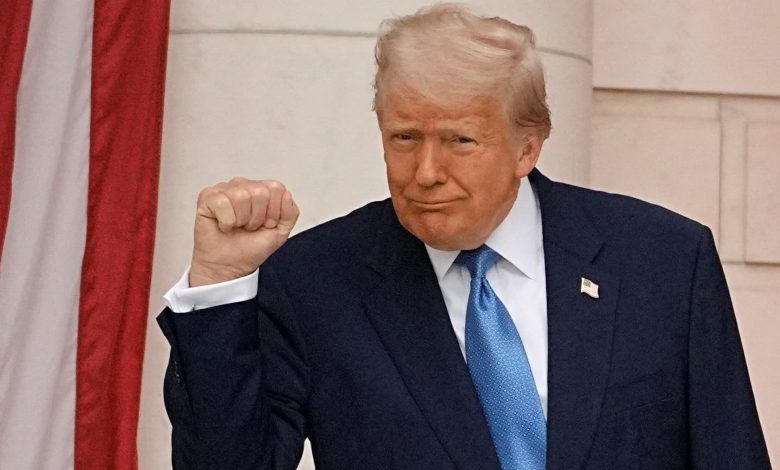‘Trump Always Chickens Out’? Investors say don’t count on it

“Trump Always Chickens Out,” or TACO, is a gibe that has ruffled the U.S. president’s feathers, and investors have, by now, seen it happening enough times to know his playbook. The phrase, coined by a Financial Times columnist, refers to Donald Trump’s pattern of threatening steep tariffs that rattle markets, only to ease or postpone them after a sharp market sell-off, prompting a recovery. “Trump’s style in negotiating deals is he huffs and he puffs, but he doesn’t blow the house down,” Ed Yardeni, president of Yardeni Research, told CNBC. In February, Trump announced a 25% tariff on imports from Canada and Mexico, before swiftly putting them on a 30-day pause just days later. And in early April, Trump slapped tariffs on more than 180 countries while escalating a tariff tit-for-tat with China, sending shock waves across financial markets. Global equities had a bloodbath in the days that followed. The U.S. benchmark S & P 500 fell about 12% between April 2 and April 8, and the MSCI world index excluding the U.S. fell over 8% in the same period. U.S. government bonds had a sell-off too. Yields on the benchmark 10-year yield jumped 10 basis points between April 2 and April 8, and the 20-year yield rose around 20 basis points, according to data on LSEG. Three stages of market reactions Then, on April 9, the president surprised markets yet again by cutting tariffs to 10% for nearly all U.S. trading partners for 90 days, leading to one of the biggest rallies on Wall Street . More recently, Trump announced 50% tariffs on goods from the European Union last Friday, sending investors trembling during the long holiday weekend, before walking back on the decision Sunday evening. U.S. equities rallied the following Tuesday, the week’s first day of trading after a holiday. Trump has realized that the stock and bond markets can have a powerful influence on his decision-making, Yardeni said, adding that the bond market had “forced” the president’s hand to postpone “reciprocal tariffs” by 90 days. “He bullies, he threatens. But there are checks and balances to what he can do as President,” Yardeni said. The U.S. federal court ruled on Wednesday that Trump overstepped his legal authority in imposing “reciprocal” tariffs. There are three distinct stages of market reactions when it comes to TACO, said Aberdeen Investments’ Ray Sharma-Ong, head of multi-asset investment solutions in Southeast Asia. First, an initial aggressive Trump policy rollout is accompanied by a sharp risk-off sentiment. That’s followed by a policy walkback and a consequent rebound in equities. The last stage is a “post-walkback ambiguity,” in which investors adopt a wait-and-see approach after the initial market rebound, attempting to price in Trump’s next move, Sharma-Ong said. Trust issues with Trump That uncertainty makes TACO a problematic bet, market watchers said. “One day tariffs go up, the next they’re ‘negotiable.’ It’s very difficult to build conviction-based positions when the policy direction keeps shifting,” said Brian Arcese, portfolio manager at Foord Asset Management. Trump’s approach is also denting traders’ confidence in U.S. policy and U.S. assets, said UBP’s head of equity research in Asia, Calder Kieran. That was the case in April, when a U.S. asset exodus occurred, leading to a weakening of the dollar and a spike in U.S. Treasury yields. While those pullbacks create attractive opportunities to allocate or enter a position in certain stocks, investors reiterated that they are sticking with the fundamentals. “There certainly is a pattern here but I would not always count on the ‘Trump put’ to happen,” said Kai Wang, Morningstar’s Asia equity market strategist, suggesting that investors stick with high-quality stocks with less drawdown during bear markets. TACO is essentially a punchier version of the Wall Street coinage, “Trump put” — in other words, when markets start to fall and Trump acts to turn them around. “It may be dangerous to believe that a Trump put is set in stone,” said Nomura’s head of global macro research, Rob Subbaraman. That’s because his administration’s negotiating power weakens as markets and foreign governments increasingly believe in the Trump put, making it a less viable strategy for him to employ, Subbaraman explained. Billy Leung, investment strategist at Global X, is, likewise, skeptical about the long-term viability of the Trump put. “The market’s reaction to tariffs has evolved. It’s not just a fade-the-headline play anymore. The Trump put has weakened,” he said. Investors should therefore move away from import-dependent names and toward companies that are actively rerouting supply chains and accelerating investment in reshoring sensitive sectors, Leung added. “Corporates are not waiting for clarity,” he said.



